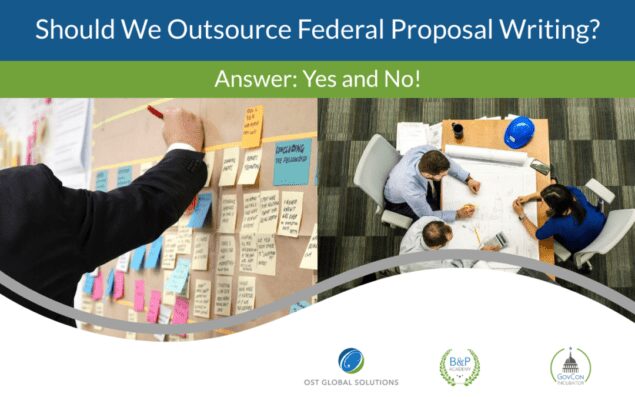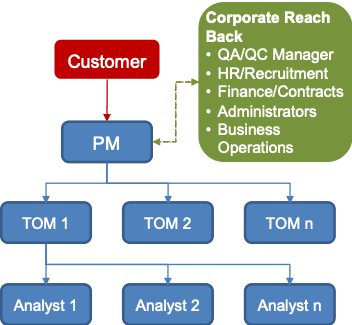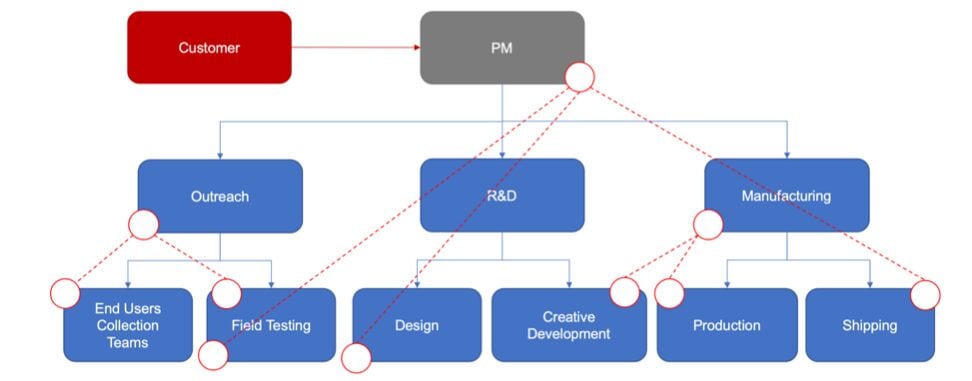Perhaps the most common complaint of proposal teams – besides never having enough time – is limited availability of talent. Business development managers and program leads must make crucial and often last-minute decisions about how to staff the effort. But an effective approach should be more thoughtful than simply filling gaps in your roster. Should you outsource federal proposal writing?
The organization of your proposal team may well mirror the structure and roles of the program team you’re proposing. If there’s a box with no performer’s name associated, there’s a gap you might consider filling by outsourcing the corresponding writing assignment. (As shown in the chart, the depth of corporate reach back resources is another consideration in deciding whether your team has the resources it needs.)
Many capable staffing agencies and consulting firms focus on federal proposal development. (We’d suggest OST is in the top tier among them!) But before the next bout of panic sets in, we’ll offer some food for thought. Taking some time now to reflect on these challenges will help ensure the efficiency and effectiveness of your approach to outsourcing proposal writing.
Key considerations in marshaling resources for your proposal efforts include:
- Security and proprietary concerns
- Differences between staff augmentation and project management
- Subject matter expert (SME) availability and involvement
- Process efficiencies and work roles
- Teaming relationships and capabilities
- Needs for turnkey support
- Cost-effectiveness
Security and Proprietary Concerns
A significant initial concern involves the sensitivity and partitioning of information. Here are some examples:
Appropriate Clearance is Only One Concern
Facility Security Officers (FSOs) will be well versed in specific procedures for dealing with classified information. However, even if a contractor holds appropriate clearance, take a conservative approach. Involve those consultants by degrees in your operation. Ideally, you won’t just let them into your inner circle. Involve contractors in less sensitive proposals and marketing initiatives before you let them into your inner circle. Just as you would with newly hired direct employees, groom consultants over a period of time. They will learn your business and you can take time to assess their readiness for responsibilities.
Get All of Your Nondisclosure Agreements Signed
As a routine procedure, consultants should sign Non-Disclosure Agreements (NDAs) to mitigate risk of unauthorized disclosures, particularly to competitors. But even with these safeguards in place, roles and responsibilities within your proposal team should be carefully partitioned.
Roles that are rarely assigned to outsiders include pricing and legal compliance. Many firms choose to physically segregate cost estimators and lawyers from the rest of the team. That said, engaging outside experts may be necessary. But you may want to limit their participation to specific, narrowly focused questions.
Roles for Your Outside Experts
A common role for an outside expert would be to review the pricing structure of the cost proposal for price-to-win strategy. Or an outside attorney might be consulted to offer an opinion on a compliance question. In these instances, the consultant should be well-known to your firm and so will likely have built a track record of reliability and trust.
If your firm has a well-indexed body of knowledge based on past efforts, a gap readily filled can be to outsource the writing of the Past Performance volume. But if your files are scanty, you’ll need to recruit some veteran employee who remembers what you did! Hiring a writer to support that individual is usually a wise move.
Differences Between Staff Augmentation and Project Management
The essential difference between a staff-augmentation agency and a consulting firm is one of responsibility:
Staff members that are hired from an agency are responsible for their individual performance. A consulting firm is typically responsible for a work product or project result.
Appreciate this difference! You might be tempted to hire a writer from an agency. This performer may have excellent communication skills but very probably lacks subject-matter expertise. The writer may be able to draw content out of busy or taciturn SMEs – or do impressive data-drilling to flesh out an outline.
But whether you hire a writer for a section or a volume lead from a proposal development consulting firm, those performers will be much more likely to bring relevant experience. They will have skills in federal proposal compliance, as well as possibly having highly relevant experience bidding the type of contract you’re chasing.
If your program or proposal team structure is matrixed – cross-linked among different functional areas – deciding how to fill resource gaps will be more challenging.
A corollary of this difference is that the best consulting firms bench, or retain, their talent between engagements, and staffing agencies typically don’t. And consulting firms have a stake in building a knowledge base about proposals and opportunities. (Staffing firms have files of resumes.)
SME Availability and Involvement
SMEs will undoubtedly provide the core content of your Technical solution. But if they are actively involved in either company operations or R&D, you can bet they won’t be available to you for the entire duration of proposal development. Here’s how to optimize their contributions:
- Even when you have SMEs available and assigned to proposal sections, consider teaming them up with writers and support staff, which could involve outsourcing. You want to capture what the experts know while conserving their time on the project. In turn, they will probably be grateful for your support and help you in other ways.
- And there’s another crucial consideration: These days, English is a second language for many SMEs. They may be more intimidated than their peers about facing a blank page or expressing their thoughts cogently. Get them help!
- As well, SMEs might not think they need to contribute much to your Management approach. And after they’ve drafted their Technical sections, they might not stick around for anything else. We’ve written extensively on how you can begin to brainstorm your Management approach [hyperlink to Creating an Organization Chart Checklist sales page] before proposal writing is under way.
Process Efficiencies and Work Roles
Here’s a way to save time and effort that you might think counter-intuitive. All too often, proposal writers put off thinking about graphics until after their section drafts are written. We suggest a more efficient approach will be to assign artists – or writers who think visually – to work with authors before they even begin to write! (See our suggestions on how to begin with a blank page by conceptualizing benefit-oriented graphics first.)
Teaming Relationships and Capabilities
These questions might seem straightforward, but the answers might not be obvious:
- Do you plan to team with another vendor on this bid?
- If so, is your company the prime or the sub?
- How much of the proposal effort can your teammate undertake?
Certainly, if another vendor is providing a key component of the Technical solution, their proposal team should be responsible for those elements. But just as important – especially if you are the prime – will be your collaboration with them to describe how your Management approach ensures their performance.
If you are a sub to a large company, you might be able to limit your contribution to the Technical sections that describe your product or service. But you’ll still need to confer closely on what you’ll contribute to the prime’s Management approach.
And if your teammate plans to outsource any part of its contributions, your proposal managers should confer at an early date on all the questions and concerns we’ve covered here.
Need Turnkey Support?
Especially if yours is a small business, an experienced proposal-development consulting firm may be able to undertake the entire proposal effort for you – or field a team at your location that can work closely with your executives, SMEs, and line managers. The key considerations here are the consulting firm’s:
- Track record in proposal development for federal contracts
- Experience with the Government customer
- Experience with the specific contract vehicle or program
- Familiarity with your industry
- Understanding of your company, its mission, and its unique selling proposition
Cost-Effectiveness
At rock bottom, the most important consideration in deciding whether or how much to outsource proposal writing comes down to this:
Where are the gaps in our resources?
And are those gaps temporary or longer-term? Ideally, you want to develop your own bench of experienced proposal developers.
But company size matters. If yours is a small business, you will probably want to consider outsourcing some – or even all – of the proposal development effort. And if yours is a medium-sized organization, you probably can’t fill all required roles internally, but you won’t have the budget to keep writers on staff between proposals. If yours is a large organization, you might judge your department fully staffed. But considering the effects of turnover and promotions, it can be a challenge to keep training new hires, especially if they have limited experience in federal bid compliance.
So, you may be able to conserve effort and expense by:
Using automated toolsets. Some commercial software packages and online services have been tailored to the specific requirements of developing proposals for federal contracts. These include RFP shredding (requirements decomposition), outlining, storyboarding, and graphics generation. A consulting firm experienced with these tools can point you in the right direction. They could also train your staff to use them.
Mixing onsite versus virtual participation. Subject to security concerns, using collaboration software and online services can:
- reduce travel time
- maximize the involvement of busy SMEs and functional managers
Develop an ongoing relationship with an experienced consulting firm that focuses on proposal development for federal contracts.
Still Wondering if You Should Outsource Federal Proposal Writing?
Hiring direct employees to staff your proposal development projects is likely to be cost-prohibitive. Particularly if you don’t have a continuous pipeline of upcoming bids. OST estimates that for small- and even medium-sized businesses, maintaining a full-time proposal staff will cost roughly three times what you would spend by judicious outsourcing.
And if your company is large, you can conserve your budget by outsourcing training and continuing education to build the professionalism of your team.
Furthermore, engaging an experienced consulting firm will almost always be far more efficient than asking a staffing agency to fill your temporary gaps.
In short, why not develop an ongoing partnership with a firm like OST! We believe the ideal solution is to maintain a relationship with expert consultants. They will understand your company and will be ready to support you whenever you need them.
Contact us to learn more.



